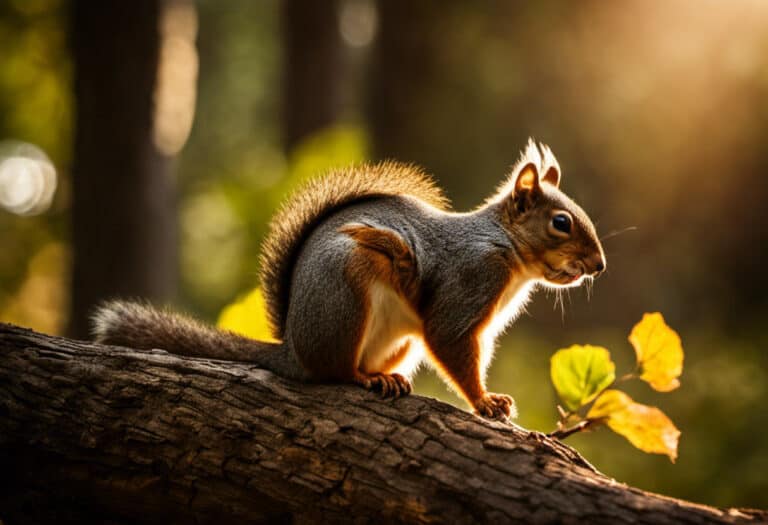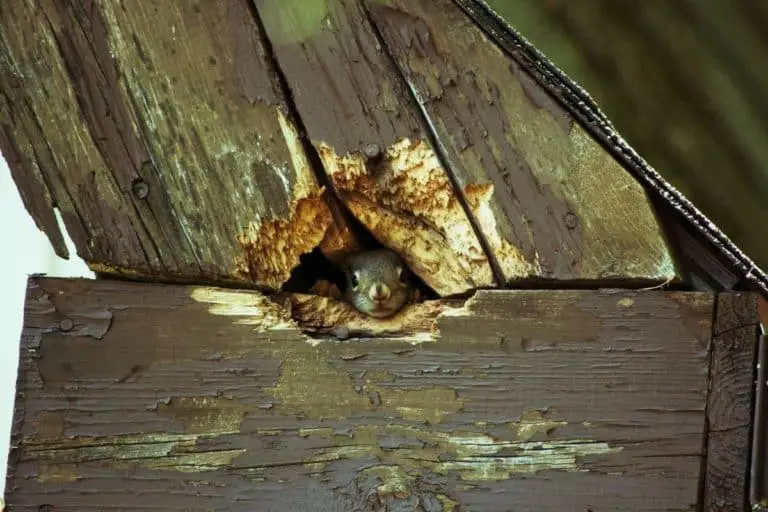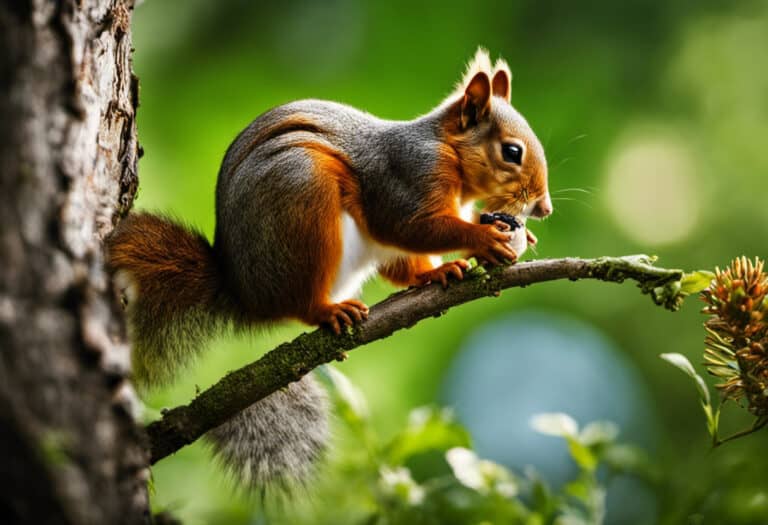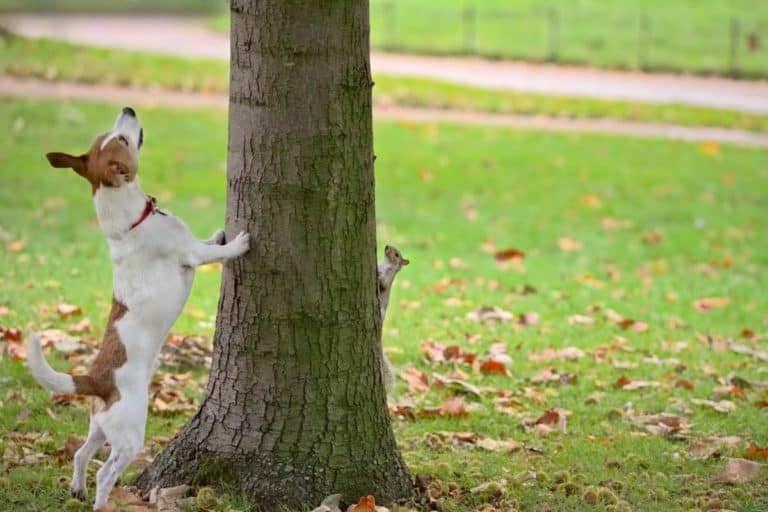Can Squirrels Eat Cashews?
Wondering if squirrels can eat cashews? You should know that while these critters are known for their hearty appetites, cashews may not be the best choice for their diet.
Squirrels require a balanced diet, but cashews have a high-fat content that can lead to obesity and health issues.
They’re also not a natural part of a squirrel’s diet, and feeding them may cause them to neglect essential foods.
Key Takeaways
- Squirrels require a balanced diet of protein, fat, vitamins, minerals, carbohydrates, and fiber.
- Feeding cashews to squirrels can lead to overeating, ignoring other essential foods, and a lack of natural diet.
- Cashews have a high-fat content compared to their regular diet, which can lead to obesity and health issues.
- Cashews are high in phosphorous, causing calcium loss and potentially leading to Metabolic Bone Disease in squirrels.
Squirrels’ Nutritional Requirements
You should be aware of the nutritional requirements for squirrels when considering what foods to feed them. Squirrels require a balanced diet of protein, fat, vitamins, minerals, carbohydrates, and fiber.
Protein is an essential component of their diet, as it helps with muscle growth and repair.
Squirrels’ protein requirements can be met through various sources, such as nuts, seeds, and insects. However, it’s important to note that cashews shouldn’t be a primary source of protein for squirrels.
While they may enjoy eating cashews, excessive consumption can hurt their nutrition. Cashews have a high-fat content, which can lead to obesity and health issues for squirrels.
Additionally, cashews contain high levels of phosphorus, which can cause calcium loss in squirrels and lead to Metabolic Bone Disease.
Therefore, it’s best to provide squirrels with a diverse diet that meets their nutritional needs without relying heavily on cashews.
The Dangers of Feeding Cashews to Squirrels
Feeding cashews to squirrels can lead to health issues due to their high-fat content and potential calcium loss.
Cashews contain 12 grams of fat per 1 oz serving, while squirrels typically eat 1.5 to 3 oz of food per day. This high fat intake can lead to obesity and other health issues for squirrels.
Additionally, cashews are high in phosphorous, which can cause calcium loss in squirrels.
Calcium is crucial for squirrels, and low levels can result in Metabolic Bone Disease (MBD), characterized by weakness, loss of appetite, lethargy, seizures, and paralysis. Feeding cashews can disrupt the balance of phosphorous and calcium in squirrels’ diets.
Therefore, it’s essential to be aware of the health risks and dietary dangers associated with feeding cashews to squirrels.
Squirrels’ Attraction to Cashew Nuts
If you offer them, squirrels will eagerly consume a variety of nuts, including cashews. Squirrels are attracted to cashew nuts because of their taste and texture.
However, it’s important to note that cashews aren’t a natural part of a squirrel’s diet.
While squirrels may eat cashews if given the opportunity, it isn’t recommended to feed them this nut due to its high-fat content and potential for calcium loss.
Instead, there are alternative nuts that are more suitable for squirrels.
Walnuts, almonds, and pecans are good options as they provide essential nutrients without adverse side effects.
It’s always best to give squirrels a balanced diet that mimics their natural feeding behavior to ensure their health and well-being.
High Fat Content in Cashews
Cashews have a high-fat content compared to the typical squirrel diet.
Comparison with other nuts:
- Cashews contain 12 grams of fat per 1 oz serving.
- Typical squirrel or rodent food contains only 2.7 grams of fat per 3 oz serving.
Potential alternatives to cashews:
- Almonds: Almonds are a good source of protein, healthy fats, and fiber. They contain less fat than cashews, with only 14 grams per 1 oz serving.
- Walnuts: Walnuts are high in omega-3 fatty acids and provide essential nutrients. They have a fat content of 18 grams per 1 oz serving, slightly higher than cashews.
Considering the high-fat content of cashews, it’s important to explore alternative nuts that provide a healthier balance of nutrients for squirrels. Almonds and walnuts are two potential options that offer nutritional benefits without excessive fat content.
These alternatives can help maintain a balanced diet for squirrels while minimizing the risk of obesity and related health issues.
Squirrels’ Daily Food Consumption
Squirrels’ daily food consumption is essential to their overall health and well-being. They require a balanced diet of protein, fat, vitamins, minerals, carbohydrates, and fiber.
It’s essential to understand their dietary requirements and provide them with the appropriate foods to prevent any health risks associated with overeating or nutritional deficiencies.
Nutritional Needs of Squirrels
You should be aware of the nutritional needs of squirrels to ensure their health and well-being.
- Squirrels require a balanced diet of protein, fat, vitamins, minerals, carbohydrates, and fiber.
- Protein is essential for growth, development, and tissue repair in squirrels.
- Squirrels’ protein requirements vary depending on age, activity level, and reproductive status.
- Young squirrels require higher levels of protein for growth and development.
- Adult squirrels need protein to maintain muscle mass and overall health.
- Fiber is crucial in maintaining digestive health and preventing constipation in squirrels.
- Fiber is essential for squirrels as it aids in digestion and helps prevent gastrointestinal issues.
- It helps regulate their bowel movements and supports a healthy gut microbiome.
- A fiber-rich diet can also help prevent obesity in squirrels by promoting feelings of fullness.
Health Risks of Overeating?
Be mindful of the health risks of consuming excessive amounts of certain foods. Overeating can have a detrimental impact on your bone health.
When you consume more food than your body needs, it can lead to weight gain and obesity. This excess weight stresses your bones, increasing the risk of fractures and other bone-related issues.
Additionally, overeating can lead to poor nutrient absorption, including calcium, crucial for maintaining strong and healthy bones. Calcium deficiency can result in conditions like osteoporosis and weakened bone structure.
Maintaining a balanced and moderate diet is essential to ensure optimal bone health. Remember to listen to your body’s hunger cues and practice portion control to avoid the health risks associated with overeating.
Comparison of Fat Content in Cashews and Regular Squirrel Diet
When comparing the fat content between cashews and the regular diet of squirrels, it’s important to note the significant difference.
Cashews contain 12 grams of fat per 1 oz serving, while the typical squirrel or rodent food contains only 2.7 grams per 3 oz serving.
This higher fat content in cashews can significantly impact squirrel health, potentially leading to obesity and other health issues.
Fat Content Comparison
Cashews have a higher fat content than the typical squirrel or rodent food. This is important to consider when feeding squirrels, as their diet should be balanced and provide the necessary nutrients.
Here is a comparison of the fat content in cashews and regular squirrel diet:
- Cashews contain 12 grams of fat per 1 oz serving.
- Typical squirrel or rodent food contains only 2.7 grams of fat per 3 oz serving.
As you can see, cashews have a significantly higher fat content than their regular diet. This can have an impact on squirrel behavior and health. Too much fat can lead to obesity and health issues for squirrels.
It’s essential to provide a balanced diet that meets their nutritional needs. Consider offering a variety of foods such as nuts, fruits, and vegetables to ensure they receive the necessary nutrients without compromising their health.
Impact on Squirrel Health
You should be aware of the impact of high-fat foods like cashews on squirrel health.
Squirrels have specific dietary requirements for optimal health. If they consume too many high-fat foods, such as cashews, they may experience weight gain and an imbalance in their diet. Squirrels need a balanced mix of protein, fat, vitamins, minerals, carbohydrates, and fiber.
While cashews aren’t part of a squirrel’s natural diet, they may still be attracted to them due to their taste.
However, cashews have a high-fat content compared to their regular food, which can lead to obesity and health issues. Additionally, cashews are high in phosphorous, which can lead to calcium loss in squirrels.
Maintaining a proper balance in their diet is essential to prevent any adverse health effects.
Importance of Balanced Diet
To ensure optimal health for your furry friends, providing them with a balanced diet that meets their specific dietary requirements is essential.
This includes the importance of portion control and considering potential alternatives to cashews.
- Portion Control:
- Squirrels in captivity should be fed about 50 calories per day, with limits on fat and sugar levels.
- Overeating tasty cashews can lead to weight gain and health issues.
- Monitoring food intake is essential to prevent obesity.
- Alternatives to Cashews:
- Provide a mix of nuts, fruits, and vegetables that are part of a squirrel’s natural diet.
- Nuts like almonds and walnuts can be offered in moderation.
- Fresh fruits and vegetables offer essential vitamins, minerals, and fiber.
Calcium Loss and Its Effects on Squirrels
Feeding squirrels a diet high in phosphorous, like cashews, can lead to calcium loss and potentially result in Metabolic Bone Disease (MBD).
Calcium is vital for squirrels’ bone health, and low levels can have detrimental effects. Cashews, although enjoyed by squirrels, contain high levels of phosphorous, which disrupts the balance of calcium in their bodies.
This imbalance can lead to MBD, a condition characterized by weakened bones and other associated symptoms.
The risks of cashew consumption for squirrels include an improper balance of phosphorous and calcium, which can result in calcium deficiency and the development of MBD.
To ensure the well-being of squirrels, it’s important to vary their diet and avoid feeding them foods high in phosphorous, such as cashews.
Importance of Calcium for Squirrels
Calcium is crucial for the bone health of squirrels. Without sufficient calcium, squirrels risk developing calcium deficiency, leading to various health problems.
Here are the reasons why calcium is essential for squirrels:
- Calcium is the main component of bones and teeth, providing strength and structure.
- It plays a vital role in muscle function, nerve transmission, and blood clotting.
- Calcium deficiency can result in weakened bones, fractures, and deformities.
- Squirrels with low calcium levels may exhibit symptoms like limping, difficulty climbing, and reduced mobility.
- Metabolic Bone Disease (MBD) is a common condition caused by calcium deficiency, characterized by weakened bones and abnormal growth.
- MBD can lead to skeletal deformities, pain, and even death.
Providing squirrels with a diet rich in calcium, such as leafy greens, nuts, and seeds, is crucial to prevent calcium deficiency. Additionally, offering a variety of foods can ensure a balanced intake of calcium and other essential nutrients.
Symptoms of Metabolic Bone Disease (MBD
If you notice weakness, loss of appetite, or difficulty moving, these could be signs of Metabolic Bone Disease (MBD) in squirrels. MBD is a condition that affects the bones and overall health of squirrels.
It is often caused by a lack of calcium in their diet, weakening bones, and skeletal deformities. The impact on squirrel behavior can be significant, as they may struggle to climb, jump, or walk properly.
In severe cases, MBD can result in paralysis or even death. The long-term effects of MBD can be debilitating, reducing the squirrel’s quality of life and limiting their ability to perform essential activities.
It is crucial to provide a balanced diet rich in calcium to prevent MBD and ensure the overall well-being of squirrels.
| Symptoms of MBD in Squirrels |
|---|
| Weakness |
| Loss of appetite |
| Difficulty moving |
| Skeletal deformities |
Imbalance of Phosphorous and Calcium in Squirrels
Feeding cashews to squirrels can lead to an imbalance of phosphorous and calcium in their diet. This is because cashews are high in phosphorous, which can cause calcium loss in squirrels.
Calcium is vital for squirrels, and an improper balance of these minerals can increase the risk of calcium deficiency and impact their bone health.
Calcium Deficiency Risks
To maintain the proper calcium balance, you must vary the food types you feed squirrels. Calcium deficiency in squirrels can have a significant impact on their bone health. Feeding cashews to squirrels poses risks to their overall well-being.
Risks of cashew consumption for squirrels:
- Cashews are high in fat compared to their regular diet, which can lead to obesity and health issues.
- Cashews contain a high amount of phosphorus, causing calcium loss in squirrels.
- Calcium is vital for squirrels; low levels can lead to Metabolic Bone Disease (MBD).
- MBD symptoms include weakness, loss of appetite, lethargy, seizures, and paralysis.
Impact on Bone Health
Including various foods in your squirrel’s diet is essential for maintaining bone health.
While squirrels may enjoy eating cashews, it’s essential to consider its impact on their overall well-being.
Cashews are high in fat, leading to obesity and other health issues if consumed in excess. Additionally, cashews contain high levels of phosphorous, which can cause calcium loss in squirrels.
This imbalance can lead to Metabolic Bone Disease (MBD), resulting in weakness, loss of appetite, seizures, and paralysis.
Furthermore, feeding cashews to squirrels may also impact their behavior, as they may become less interested in eating other essential foods.
Lastly, it’s worth noting that some squirrels may have potential allergic reactions to cashews, emphasizing caution when introducing this food into their diet.
Varying Squirrels’ Diet for Calcium Deficiency Prevention
To prevent calcium deficiency in squirrels, it’s essential for you to vary their diet and include a range of different foods.
Squirrels require protein, fat, vitamins, minerals (like calcium), carbohydrates, and fiber. Providing a variety of foods ensures that squirrels receive all the necessary nutrients for their overall health, including calcium.
Calcium is vital for squirrels, and a lack of it can lead to Metabolic Bone Disease (MBD). To prevent calcium deficiency, you can include alternative calcium sources in your diet, such as leafy greens, broccoli, almonds, and kale.
These foods are rich in calcium and can help maintain the proper balance of phosphorous and calcium in squirrels.
Monitoring Squirrels’ Health After Feeding Cashews
After feeding cashews to squirrels, monitoring their health for potential issues is essential. Monitor their behavior and look for abnormal symptoms that may indicate health problems.
Some potential health issues squirrels may experience after consuming cashews include obesity and calcium deficiency.
Excessive fat intake from cashews can lead to weight gain and obesity in squirrels, negatively impacting their overall health. Additionally, the high phosphorous content in cashews can cause calcium loss in squirrels, potentially leading to metabolic bone disease.
Symptoms of calcium deficiency may include weakness, loss of appetite, lethargy, seizures, and paralysis.
Risks of Obesity and Health Issues in Squirrels
Excessive fat intake from cashews can lead to weight gain and obesity in squirrels, negatively impacting their overall health.
- Risks of overeating:
- Squirrels in captivity are less active and may overeat tasty cashews.
- Feeding cashews can cause them to ignore other essential foods.
- Impact on bone health:
- Cashews are high in phosphorus, which can lead to calcium loss in squirrels.
- Calcium is vital for squirrels, and low levels can result in Metabolic Bone Disease (MBD).
MBD symptoms include weakness, loss of appetite, lethargy, seizures, and paralysis. Feeding cashews can disrupt the balance of phosphorus and calcium in squirrels, potentially worsening their bone health. It’s important to vary the types of food squirrels receive to prevent calcium deficiency.
Additionally, the high-fat content in cashews compared to their regular diet increases the risks of obesity and health issues in squirrels. Monitoring their fat intake and providing a balanced diet is crucial for maintaining their health and well-being.
Cashews as Non-Natural Food for Squirrels
Feeding cashews to squirrels isn’t recommended due to several reasons.
Firstly, cashews aren’t part of a squirrel’s natural diet, which consists of nuts, fruits, veggies, and other foods found in their natural environment.
Secondly, squirrels in captivity may overeat tasty cashews and ignore other vital foods, leading to an imbalanced diet.
Lastly, cashews have a high-fat content compared to their regular diet, which can contribute to obesity and health issues in squirrels.
Nutritional Impact of Cashews
Cashews have a high-fat content compared to a squirrel’s regular diet. This can lead to weight gain and potential health issues for squirrels. It’s essential to consider cashew alternatives to meet their nutritional needs.
- Squirrel’s weight gain:
- Cashews are high in fat, which can contribute to obesity in squirrels.
- Obesity increases the risk of heart disease, diabetes, and other health problems in squirrels.
- Cashew alternatives:
- Provide a balanced diet of nuts, fruits, vegetables, and other foods found in their natural environment.
- Squirrel-specific food blends provide the necessary nutrients without excessive fat content.
Risks of Cashew Consumption?
If you’re concerned about the risks of cashew consumption, it’s essential to consider the potential impact on a squirrel’s health. While squirrels will eat almost anything, including cashews, feeding them these nuts can pose risks.
One of the main concerns is the potential for cashew allergies. Squirrels, like humans, can develop allergies to certain foods, and cashews are no exception.
Allergic reactions can range from mild symptoms like itching and sneezing to more severe reactions such as difficulty breathing and anaphylaxis.
In addition to the risk of allergies, cashews can also cause potential digestive issues for squirrels. Chews’ high-fat content can lead to obesity and other health problems.
Furthermore, cashews are high in phosphorous, which can cause calcium loss in squirrels and lead to Metabolic Bone Disease.
Monitoring squirrels for unusual symptoms is essential if you feed them cashews.
Public Rules and Feeding Squirrels
Remember to check the rules and regulations in public places before offering food to squirrels.
Public park regulations may prohibit feeding wildlife for various reasons, including preserving natural ecosystems, preventing overpopulation, and protecting the health and safety of animals and humans.
If you want to provide food for squirrels in public spaces, consider alternative foods that are safe and suitable for their dietary needs. Some options include:
- Nuts: Offer unsalted and unroasted nuts like almonds, walnuts, and pecans.
- Fruits: Provide tiny pieces of apples, bananas, or berries.
- Vegetables: Offer carrots, broccoli, or leafy greens like spinach.
- Seeds: Squirrels enjoy sunflower seeds and pumpkin seeds.
Frequently Asked Questions
Are Cashews Part of a Squirrel’s Natural Diet?
Cashews are not part of a squirrel’s natural diet. Squirrels have specific nutritional needs, and their diet should consist of nuts, fruits, veggies, and other foods found in their natural environment.
How Can Feeding Cashews Lead to an Imbalance of Phosphorous and Calcium in Squirrels?
Feeding cashews to squirrels can lead to an imbalance of phosphorous and calcium, which can have long-term effects. Cashews are high in phosphorous and can cause calcium loss, resulting in conditions like Metabolic Bone Disease.
What Are the Symptoms of Metabolic Bone Disease (Mbd) in Squirrels?
Symptoms of MBD in squirrels include weakness, loss of appetite, lethargy, seizures, and paralysis. Prevent MBD by ensuring a balanced diet with proper calcium levels and varying the types of food squirrels receive.
Why Is It Important to Vary a Squirrel’s Diet to Prevent Calcium Deficiency?
It’s important to vary their diet to prevent calcium deficiency in squirrels. A varied diet ensures they receive a proper balance of nutrients, including calcium. This helps prevent conditions like Metabolic Bone Disease and promotes overall health.
Can Feeding Cashews to Squirrels Lead to Obesity and Other Health Issues?
Feeding cashews to squirrels can lead to obesity and other health issues. Cashews are high in fat, which can cause weight gain. Squirrels need a balanced diet to prevent health problems.
Conclusion
In conclusion, it isn’t recommended to feed cashews to squirrels due to their high-fat content and potential negative impact on squirrel health. Squirrels require a balanced diet that aligns with their natural nutritional needs, and cashews don’t provide the necessary nutrients properly.
Feeding cashews to squirrels may lead to obesity, health issues, and an imbalance in essential minerals like calcium. It’s important to prioritize the well-being of squirrels by providing them with a suitable diet.





